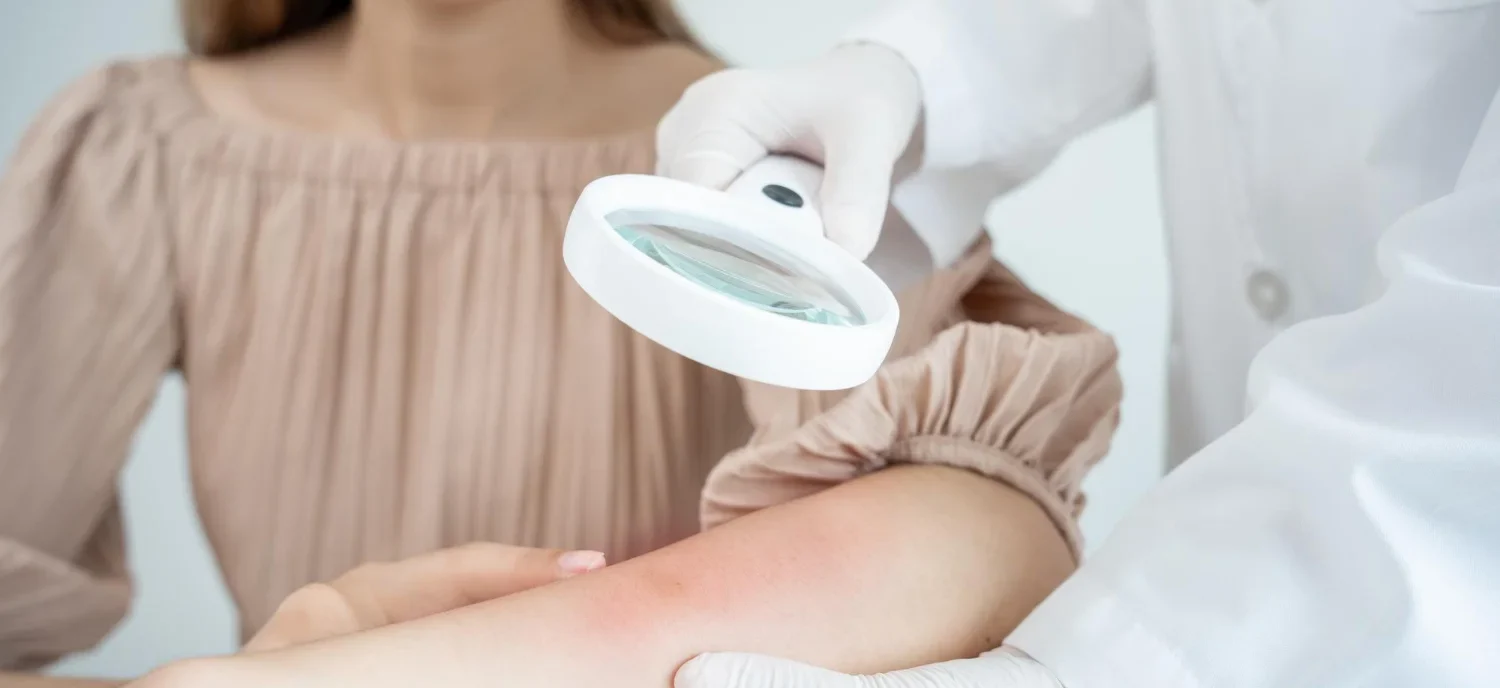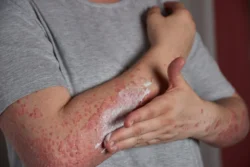
How Long Do Hives Last?
Waking up with itchy red bumps on your skin can be stressful and confusing. Whether you have a few spots or a whole patch of hives, one of the first questions you may ask is, “How long will this last?”
Hives, also called urticaria, are a common skin reaction. They appear suddenly and often disappear just as fast, but not always. Some people have hives for just a few hours while others may deal with them for days, weeks, or even months.
In this blog, we will explore how long hives usually last, what can affect their duration, and when to see a doctor. We will also share tips to manage hives and help your skin recover more comfortably.
What Are Hives?
Hives are raised, itchy welts or bumps on the skin. They can vary in size and shape. Some look like small red dots, while others form large, swollen patches. These welts may appear anywhere on the body and often change location, fading in one spot and popping up in another.
The most common symptoms of hives include:
- Red or pink patches
- Swelling
- Itching
- Warmth or slight burning
Hives happen when your body releases histamine, a chemical that makes small blood vessels in your skin leak fluid. That fluid collects under the skin and causes the swelling you see.
How Long Do Hives Usually Last?
The answer depends on what type of hives you have. Hives are generally classified into two types based on how long they last:
1. Acute Hives
This is the most common form. Acute hives last less than six weeks. In many cases, each individual hive may only last a few hours before fading. The overall outbreak might last a day or two or up to several days, but it usually goes away on its own.
Common causes of acute hives include:
- Food allergies
- Insect bites or stings
- Medications
- Viral infections
- Stress or anxiety
- Environmental factors like cold, heat, or sunlight
In children and adults, viral infections are one of the most frequent triggers for short-term hives.
2. Chronic Hives
Chronic hives last longer than six weeks. In some cases, people can have hives on and off for months or even years. These hives are more difficult to treat and often come without a clear cause.
Some people with chronic hives have symptoms every day, while others have them only a few times per week. The hives may disappear for a while and then return without warning.
Chronic hives can be caused by:
- Autoimmune conditions
- Long-term stress
- Hormonal changes
- Unknown triggers
Often, no specific reason is found, which can be frustrating for both patients and doctors.

How Long Does Each Individual Hive Last?
While an outbreak might last for days or weeks, each individual hive typically lasts for a short period of time. Most hives fade within 24 hours, sometimes even in just a few hours. New hives may appear in different spots as older ones fade.
If hives last more than 24 hours in the same spot, or if they leave a mark or bruise, this may suggest a different condition such as urticarial vasculitis. This is rare and would require a medical evaluation.
What Affects How Long Hives Last?
Several factors can influence how long hives stick around. These include:
1. The Cause of the Hives
If hives are caused by something that is quickly removed from your body, like a food or drug allergen, they may disappear quickly. If they are related to an ongoing condition, they may last longer.
2. Your Immune System
Everyone’s immune system is different. Some people react strongly to a small trigger while others barely react at all. If your immune system stays activated, hives may continue to appear.
3. Medications or Treatment
If you take antihistamines or other medications early, they may help stop the reaction sooner. Delayed treatment may lead to longer outbreaks.
4. Stress and Emotional Factors
Stress does not always cause hives, but it can make them worse or more persistent. People under a lot of emotional strain may find their hives last longer or come back more often.
Can You Speed Up the Healing of Hives?
Yes. There are ways to help relieve hives and possibly shorten their duration.
Try the following:
- Take an antihistamine: Over-the-counter antihistamines such as cetirizine, loratadine, or diphenhydramine can block histamine and reduce itching and swelling.
- Avoid scratching: Scratching can irritate the skin more and may delay healing.
- Use cool compresses: Applying a cool, damp cloth can soothe the skin and reduce inflammation.
- Wear loose clothing: Tight clothing can rub against hives and make them worse.
- Stay away from known triggers: If you know what caused the hives, try to avoid it as best as you can.
If your hives are severe or do not respond to over-the-counter treatments, a doctor may prescribe stronger medications.
When Should You See a Doctor?
Although hives are usually harmless, there are times when you should seek medical help.
- Your hives last more than a few days
- You have recurring hives for several weeks
- Hives interfere with your sleep or daily life
- You cannot find relief with standard treatments
- You have symptoms of a more serious allergic reaction, such as swelling of the face, lips, tongue, or throat, difficulty breathing, or chest tightness
These signs may point to anaphylaxis, which is a medical emergency. Do not wait to seek help in those situations.
For chronic hives, it is important to work with a healthcare provider. They may order blood tests, allergy tests, or refer you to a specialist such as an allergist or dermatologist.
What Is the Outlook for People With Hives?
The good news is that most cases of hives are temporary and not dangerous. Acute hives usually clear up within a few days, especially when the trigger is removed or treated. Even chronic hives, while frustrating, are usually not life-threatening and can often be managed with the right treatment plan.
Some people outgrow their triggers. Others find relief by adjusting medications, changing their environment, or managing stress levels.
Can Hives Come Back After They Go Away?
Yes, hives can come back even after they disappear completely. If the trigger returns or if your body has not yet fully recovered, new hives may appear. Some people deal with occasional flare-ups for years. Others only experience them once or twice in their life.
Recurring hives do not always mean something serious is wrong, but if they happen often or without a clear reason, it is a good idea to speak with a doctor.
Can Hives Last for Months or Years?
In rare cases, yes. Chronic hives can last for months or even years. Some people live with daily or weekly flare-ups for a long time. This condition can affect quality of life and may require ongoing treatment. There are even cases where no trigger is ever identified, which can make it difficult to treat.
Despite this, many people with chronic hives do find relief. Newer medications and a better understanding of the immune system have helped many people control their symptoms and live more comfortably.

Conclusion
How long hives last depends on many things. For most people, they fade within a few hours to a few days. When hives last longer than six weeks, they are considered chronic and may need medical attention. Although hives can be irritating and sometimes scary, they are often manageable with the right approach.
If you or someone you know is dealing with hives, try not to panic. Track when they appear, notice any patterns or triggers, and talk with a healthcare provider if the problem continues.
Knowing what to expect can help you stay calm, avoid unnecessary worry, and find the right treatment when needed.
